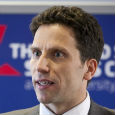
 As one of the founding principles of the EU’s single market, the right to freedom of movement allows EU citizens to travel freely across the 28 Member States and to take up work in a place of their choosing. With very high numbers of EU citizens arriving in the UK in recent years, advocates of a Brexit often argue that this right has led to higher immigration than the UK can readily absorb, and one of the aims of David Cameron’s renegotiation was to curb the incentives for EU migrants to come to Britain. The purpose of the LSE Commission on the Future of Britain in Europe hearing was to discuss the overall costs and benefits of this fundamental principle of the European Union. It took into account a wide range of expert opinions, while considering different policy options in the context of the forthcoming referendum.The chair Eiko Thielemann (left) and Daniel Schade report..
As one of the founding principles of the EU’s single market, the right to freedom of movement allows EU citizens to travel freely across the 28 Member States and to take up work in a place of their choosing. With very high numbers of EU citizens arriving in the UK in recent years, advocates of a Brexit often argue that this right has led to higher immigration than the UK can readily absorb, and one of the aims of David Cameron’s renegotiation was to curb the incentives for EU migrants to come to Britain. The purpose of the LSE Commission on the Future of Britain in Europe hearing was to discuss the overall costs and benefits of this fundamental principle of the European Union. It took into account a wide range of expert opinions, while considering different policy options in the context of the forthcoming referendum.The chair Eiko Thielemann (left) and Daniel Schade report..
Early on in the discussion it emerged that one of the main obstacles to an informed debate on the topic is that it is difficult to establish even the most basic facts on the use and consequences of this right, given the paucity of available data. This is mainly due to the fact that statistics gathered on the topic do not distinguish readily between EU citizens who decide to reside permanently in a different country, and those who only move temporarily for short-term work or studies.

Participants decided to evaluate the topic from different perspectives – looking at the effects on main recipient countries, like the UK or Germany, or on sending countries such as Poland or Spain, or indeed on the EU as a whole. While some pointed to the aggregate effects of the freedom of movement, other cautioned that it was important to look at what freedom of movement means for different types of people.
While participants differed in their overall assessment, a large majority pointed to a significant body of evidence that suggests that freedom of movement has made both Britain and the EU more prosperous overall. Nonetheless, the influx of EU migrants to the UK does have some negative aspects, such as possibly holding down the wages of low-skilled workers in the UK and putting some pressure on the British welfare state.
Looking at different scenarios to address some of these issues, participants were unanimous in pointing out that simply limiting the access of newly-arrived EU citizens to the UK’s welfare system, as promised in the reform deal negotiated by David Cameron, was likely to have only a very small effect on migrant flows to the UK.
This is due to the fact that it isn’t specific welfare provisions but the overall availability of jobs – and the rather dire job prospects in migrants’ home countries – that have attracted people to the UK.
Most participants also agreed that given the UK’s open economy, which requires a constant supply of skilled and unskilled labour, the probable post-Brexit scenarios were also unlikely to end significant levels of immigration to the UK.
Overall, the meeting highlighted that establishing the costs and benefits of the EU’s freedom of movement largely depends on the perspective taken; and secondly, that neither the ‘emergency brake’ negotiated by Cameron, not even a British exit from the EU, should be expected to fundamentally reverse immigration dynamics in the UK. In sum, there are no easy solutions to addressing the present challenge of EU migration.
This post represents the views of the authors and not those of the BrexitVote blog, nor the LSE.
Eiko Thielemann is an Associate Professor in European Politics and Policy at the London School of Economics, where he is the director of the LSE Migration Studies Unit (MSU). He is a Global Associate Professor at New York University (NYU) and a board member of the Journal of Refugee Studies. His research focuses on EU- and comparative policy -making, in particular asylum and immigration issues. He is a founding member of IMPALA, the International Migration Policy And Law Analysis Database.
Daniel Schade is a doctoral researcher in the International Relations Department at the LSE and the deputy chairman of Project for Democratic Union.






